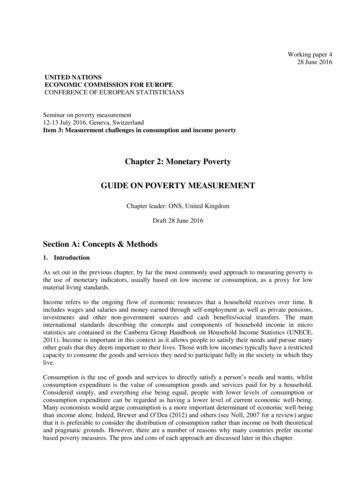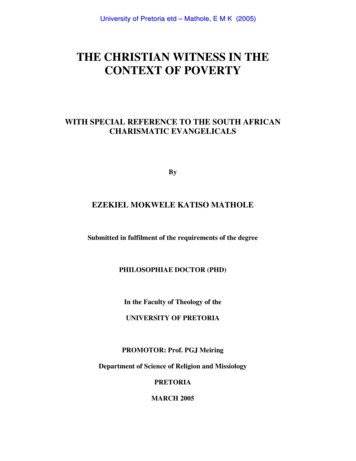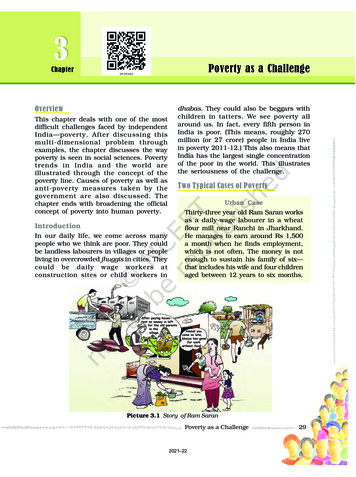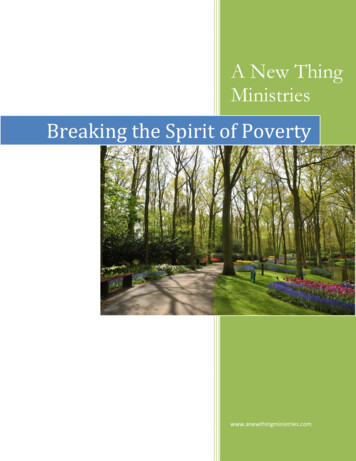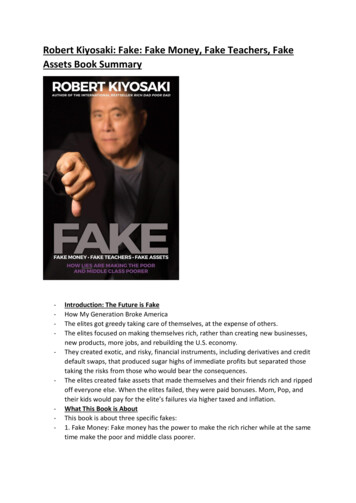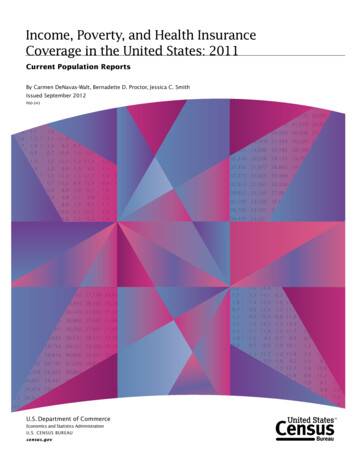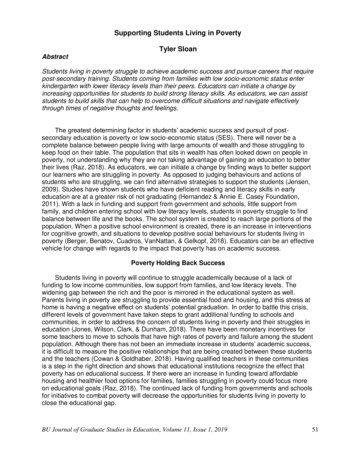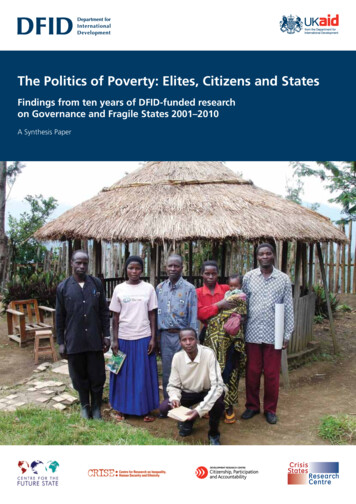
Transcription
The Politics of Poverty: Elites, Citizens and StatesFindings from ten years of DFID-funded researchon Governance and Fragile States 2001–2010A Synthesis Paper
AcknowledgementsThis paper was written by DFID Research and Evidence Division Staff, with help andadvice from Graeme Ramshaw of IDS and from the directors and staff of the four Re search centres.Disclaimer: This synthesis presents some key findings of DFID-funded research andthe resulting policy recommendations of the researchers: it does not necessarily reflectDFID policy.Cover Photo: Justice and Peace Commissioners, Masisi, DR Congo. Sarah MacGregor / DFID
The Politics of Poverty: Elites, Citizens, and StatesEXECUTIVE SUMMARYExecutive SummaryEvidence shows that in order to deliver sustainableinternational development we must be able to understandand work with its politics.Governance describes the way countries and societies manage their affairs politicallyand the way power and authority are exercised. For the poorest and most vulnerable, thedifference that good, or particularly bad, governance, makes to their lives is profound: theinability of government institutions to prevent conflict, provide basic security, or basicservices can have life-or-death consequences; lack of opportunity can prevent generationsof poor families from lifting themselves out of poverty; and the inability to groweconomically and collect taxes can keep countries trapped in a cycle of aid-dependency.Understanding governance, therefore, is central to achieving development and endingconflict.During the 1990s donors came to realise that development required better ‘governance’,and DFID recognised early on the need to work with the research community to identifyways of improving governance for better development outcomes.The Centre for Future States and the Citizenship,Accountability and ParticipationProgrammes (Institute of Development Studies, Sussex); the Crisis States Research Centre(London School of Economics); and the Centre for Research on Inequality and Ethnicity(CRISE, Oxford University) have been funded by DFID over the past ten years. Thispaper provides a brief overview of what these different programmes have told us aboutgovernance, fragility and conflict in the developing world.The key message from all four research programmes is that to understand developmentwe must understand the politics that shape it. Ultimately it is political decisions thatwill shape whether or not the Millennium Development Goals are reached, revenues areraised to fund investment, and growth occurs.The research argues that the political settlement is central to all development; and onethat does not exclude powerful players is more likely to prevent conflict. But settlementsalso need to work at the grass roots level, representing the interests of social groups.Security is a precondition for development; this is a matter of survival and must beprioritised in countries recovering from conflict. Evidence presented here shows that incountries where cultural or ethnic groups feel there is economic, political and socialinequality, wars are more likely. The future face of insecurity is not restricted to civilwars – more and more people are dying in social violence, particularly in cities[Chapters 2, 3 and 4].The research looks at how governments can become more inclusive, andtherefore more stable. States that are accountable only to some groups or that do
EXECUTIVE SUMMARYThe Politics of Poverty: Elites, Citizens, and Statesnot regard some members of society as ‘citizens’ create inequalities that can fuel conflict.When citizens actively participate in society through local associations andmovements outside the state, there are benefits to both state and society[Chapters 5 and 6].The poor, more than any other group, rely on basic public services. For vulnerablefamilies, access to education and healthcare are important routes out of poverty.The politics matters: services work better for the poor when poor citizens participatein reform of service delivery and the research looks at how this can be most effectivelyachieved. In conflict affected states the provision of services is very sensitive. Servicedelivery targeting excluded groups can reduce political tensions and improved security[Chapter 7].DFID-funded research has made a key contribution in drawing attention to theimportance of taxation in building effective states. Taxes, raised in ways thatencourage economic growth and promote political accountability, build the politicallegitimacy of the state and offer the eventual ‘exit strategy from aid’. Tax revenuesallow states to provide security and public services while prioritising their own (ratherthan donor) policy concerns. Tax reforms can encourage interest groups in society tomobilise politically – an important bargaining process between state and citizen-taxpayerswho perceive they may have a genuine stake in better government [Chapter 8].Economic growth allows people to escape cycles of poverty and countries toend dependency on aid. But the findings shown here question some of the blueprintsdonors recommend for achieving growth. Some of the most successful examples of rapideconomic growth in the developing world, such as China and Vietnam, have certainlynot followed the ‘investment climate’ prescription. Donors may need to acknowledgethe political dynamics of growth, including that some forms of informal relationshipsbetween business and state in developing countries can succeed in generating andsustaining high levels of growth [Chapter 9].The report concludes [Chapter 10] with a proposal to improve how the internationalcommunity commissions and uses governance research, indicates why further governanceresearch is needed, and how DFID plans to respond.This research adds depth to our understanding of development as a political process,provides rich evidence based on country experience, and points to the questions whichaid agencies must address in order to be effective – including in more fragile countries. Itdemonstrates that durable reforms need to be constructed, nationally and locally, in a waythat fits each political context and it challenges donors to build the capacity to contributeto this effectively.
The Politics of Poverty: Elites, Citizens, and StatesContentsChapter 1Introduction1.11.21.31.41.51.6Chapter 2Elites and Development2.12.22.32.4Chapter 3Violence and DevelopmentThe ‘Resource Curse’Violence and InequalityRegional Dimensions of ConflictSecurity and Long-Term DevelopmentFragile States, Fragile CitizenshipMore Equitable and Inclusive States5.15.25.35.45.5Chapter 6FragilityMeasuring FragilityState-Building and Peace-BuildingResilient States are not necessarily DevelopmentalCitizens in Fragile StatesViolence and Security4.14.24.34.44.54.6Chapter 5The Political SettlementElite IncentivesState and SocietyInformal Institutions‘Fragile’ States3.13.23.33.43.5Chapter 4Background: 2001-2010Governance Research shapes Development Thinking and PracticeDevelopment is PoliticsImpactCross-cutting themesBreakdown of the ReportEffective CitizensCitizensDecentralisationInformal InstitutionsDemocracyEffective Citizens, Effective States6.16.26.36.46.56.6Active CitizensParticipationCivil SocietyWho Really Speaks for Poor People?Women’s ParticipationCoalitions for ChangeCONTENTS
The Politics of Poverty: Elites, Citizens, and StatesCONTENTSChapter 7Improving Public Services7.17.27.37.47.5Chapter 8Tax as State-Building8.18.28.38.48.5Chapter 9Improving Public ServicesCollective ActionAccountabilityNon-State Service ProvidersInequalities and RightsTax is PoliticsTax and the Informal EconomyTax and Local GovernmentTax Effort and Aid DependencyTax and InequalityGovernance and Economic Growth9.19.29.39.49.5The Politics of Economic GrowthWhat Really Works?Power, Relationships and Economic GrowthNatural ResourcesPromote both Economic Growth and Political StabilityChapter 10 Conclusion10.1 How should we do things differently?10.2 Build an international community of practicein governance research10.3 What more governance research is needed?
Chapter 1Introduction“For the poorest and most vulnerable, the differencethat good, or particularly bad, governance makesto their lives is profound”Photo: Ethiopia Civil Service’s Code of Ethics. David Pratt / DFID
ChAPtER 1Introduction02 The Politics of Poverty: Elites, Citizens, and States1.1 Background: 2001–2010During the 1990s donors came to realise that development required a strategy forbuilding the capabilities of the state so governments could create the conditions anddeliver the services necessary to reduce poverty. The need for better ‘governance’ (thatis, political systems and public institutions) that could deliver the necessary policies andservices and combat corruption was outlined in DFID’s 2001 governance strategy.1However, the international community at that time lacked clarity or consensus on how tobuild the necessary political systems and public institutions. Many development agencieswere uncomfortable about recognising that politics is central to all governance issues.Attempts to transfer blueprints and ‘good practice’ from the developed world met withrepeated failure. In many cases Western models of public sector reform did not workwhen transplanted, and the introduction of multi-party elections failed to deliver genuinedemocracy. Early on DFID saw the need to work with the research communityto try to identify how to improve governance for better development outcomes.1.2 Governance Research shapes DevelopmentThinking and PracticeGovernance makes a big difference to all of us: it determines our security from conflict,disease and destitution; our freedom to participate in our societies and to have a say in theway we are governed; and our opportunities to educate ourselves and to be economicallyproductive, securing a better future for ourselves and our communities. For the poorestand most vulnerable, the difference that good, or particularly bad, governancemakes to their lives is profound: the inability of government institutions to preventconflict, provide basic security, or basic services can have life-or-death consequences;lack of opportunity can prevent generations of poor families from lifting themselves outof poverty; and the inability to grow economically and collect taxes can keep countriestrapped in a cycle of aid-dependency. Understanding governance therefore iscentral to achieving development and ending conflict. Why do countries withsimilar conditions achieve startlingly different development outcomes? Policy-makersand researchers share an interest in understanding how some countries build durablesecure states while others become mired in violence. We need to know why one countrymay perform well in revenue collection, while apparently identical revenue-collectioninstitutions elsewhere may fail to function; or why an electoral process in one countryachieves coalitions for change, but the same process in another leads to political instabilityand even conflict.1. DFID (2001). Making Government Work for Poor People: Building State Capability. Effective political systems were recognised as one of theseven key capabilities. this paper represented the international consensus at that time.
The Politics of Poverty: Elites, Citizens, and States 03This paper provides a brief synthesis of some of the answers to these critical concerns. Itoutlines the findings and operational implications from the major research programmes(see Box 1) on governance funded by DFID over the last 10 years. The investment inthis research, less than 0.5% of DFID expenditure on governance reforms,2 has helpedin providing intellectual depth and coherence for DFID governance programmes.DFID-funded research has also had a much wider impact due to the important cross cutting role of governance in all country and sector programmes, and due to DFID’sleading role in shaping international thinking on governance through engaging the WorldBank, OECD DAC, EU, UN and other international and bilateral organisations as wellas partner governments. The long-term impact and rate of return on investmentin governance research appears considerable when, for instance, improving the politicallegitimacy of the state in Africa is calculated to be worth up to 2.5% GDP per annum,and some governance reforms deliver immediate very high returns.3Box 1 DFID-Funded Governance Research Programmes The Centre for the Future State (based at Institute of DevelopmentStudies, Sussex). The Centre on Citizenship, Participation and Accountability(Institute of Development Studies, Sussex). The Centre for Research on Inequality, Human Security and Ethnicity(CRISE, University of Oxford). The Crisis States Research Centre (London School of Economics).1.3 Development is PoliticsThe key message from all four research programmes has been the centrality of politicsin building effective states and shaping development outcomes. It shows ‘politics’ notas an abstract concept, but as an essential determinant of the Millennium DevelopmentGoals – that is, better educated, healthier, more prosperous people. The research hasdelivered this message in many ways. It provides evidence of politics as the ‘driverof change’ and as the ultimate cause of people’s security and access to justice. It showshow local the local political economy influences taxation4, fragility and the ability of2Governance research cost under 23m over ten years. During the five years to 2009 around 19% of DFID resources, ( 2.9bn) wereallocated to governance-related reforms (11% bilaterally and 8% multilaterally) according to the 2010 DFID Governance Portfolio Review(May 2010). Governance research findings also inform much broader programmes given the important cross-cutting role of governance inall country and sector programmes.3Englebert, P. (2002). State Legitimacy and Development in Africa; the DFID Governance Portfolio Review (2010) found that in Ugandatax reforms in the mid-2000s yielded 800% or additional revenue of 80 million over 4 years on total donor investment of 9.5 million.4DFID-funded research on the importance of the political dynamics of bargaining and accountability that make taxation critical forstate-building directly shaped OECD DAC work, and was the inspiration for the ‘tax as state-building’ approach adopted at theestablishment of the African tax Administrators Forum in 2007. See also Everest-Phillips, Max (2010), State-Building taxation forDeveloping Countries: Principles for Reform Development Policy Review Vol 28 (1), pp75-96.ChAPtER 1Introduction
ChAPtER 1Introduction04 The Politics of Poverty: Elites, Citizens, and Statescitizens to participate in their own development. At country level it has helped deepenan understanding of how horizontal inequalities created conflict in Nepal and the needto redress them in post-conflict work.6 Insights on the role of citizen participation (inpromoting health outcomes) helped improve the design of a 200m World Bank healthreform programme in Brazil.The research has helped drive an evolution in donors’ development thinking.Ten years ago, the international community’s governance emphasis was on technocraticfeatures. These included government administrative structures, resource management,personnel processes, and procedures to provide an environment where trained officialscould function more efficiently. Governments’ role in service delivery was acknowledged,but economic reform policies still pushed technical solutions, underpinned by a belief inliberalisation of the economy and the downsizing of the state. ‘Democracy promotion’was based on over-optimistic assumptions.7The limited success of these policies brought a demand for a better understanding ofgovernance, anchoring public administration in the much broader context of publicauthority and political legitimacy. In responding to this challenge, DFID-fundedgovernance research has made a critical contribution. It has highlighted the role ofcontestation and bargaining between the state, elites and citizens in building thepublic institutions that deliver development. It has illustrated the essential role ofindigenous political processes for working out a country’s own development andinstitutions – something the transfer of blueprints from another country or the developedworld could not achieve. In doing so, it has cast light on the difficult questions and tradeoffs that donors must address when they design interventions aimed at reducing povertyand boosting development.5 Eg Unsworth, S (2006), Getting Better Governance: Insights from new Research Trocaire Development Review, Dublin, pp17-33.6 Murshed, SM and Gates, S (2005), Spatial horizontal inequality and the Maoist insurgency in Nepal, Review of Development EconomicsNo 9(1), pp121-134; Brown, G (forthcoming), Post-conflict policies in Nepal, in Langer, A, Stewart, F and Venugopal, R Policies, towardshorizontal Inequalities in Post-Conflict Situations, London: Palgrave.7 See especially the work of thomas Carothers, including: Aiding Democracy Abroad (1999), and Critical Mission: Essays on DemocracyPromotion (2004).8E.g. Problem-driven Governance and Political Economy Analysis, World Bank 2009: “Governance and political economy analysis has acrucial part to play in enhancing the effectiveness of development. Across the World Bank, there is a widely shared perception thatwe need to gain a better understanding of the environments in which Bank operations are taking place and seek to promote progressivechange (IEG 2006, 2008). This coincides with an increasing recognition that governance and political economy (GPE) factors play apowerful role not only in a country’s overall development path, but also for shaping policies in various sectors and the way they are beingimplemented. Moreover, an analytic approach to governance and political economy is essential to making progress in addressinggovernance to unlock development, as committed to in the 2007 GAC Strategy and subsequent Implementation Plan”. ceurlname PGPEbook121509.pdf;tools for institutional, political, and social analysis of policy reform: a sourcebook for development practitioners, World Bank: “It isincreasingly recognized that failure to anticipate political and institutional challenges is often a chief cause of unsuccessful policy reformprocesses, with unintended social consequences for often vulnerable and poor groups.” sources/1424002-1185304794278/tIPs Sourcebook English.pdf.
The Politics of Poverty: Elites, Citizens, and States 05Research has shown that political context and process is central to shaping the waypoliticians and policy makers decide for or against progressive changes that can deliverlegitimate, capable, accountable and responsive states. It has helped explain why somecountries achieve economic growth and political stability, while others remain locked inconflict and poverty. It has provided evidence and analytical tools to show how towork with the structures, relationships, and interests that support or undermine change.8However, while all this has helped with the design of country programmes and projects,we still need a better understanding of the politics of development and how to influenceit for faster poverty reduction. Donors need to invest in their own capacity to addressthis new governance agenda.1.4 ImpactThe research output has been extensive. Over the last decade the four researchcentres have produced more than 600 working papers, books, briefing notes and peerreviewed academic journal articles, covering a wide variety of governance topics. Thesehave involved both theory and fieldwork in Asia, Africa and Latin America – frommiddle-income countries such as Brazil to low-income ‘fragile’ and post-conflict statessuch as the DRC and Afghanistan or the ‘failed’ state of Somalia.9 This synthesis makesavailable some brief highlights. We hope it will also stimulate interest in the detailedacademic findings and policy recommendations in their own right. It aims to encourageyou to go back to the original research, and also to read the synthesis of findings that eachprogramme has produced. And it seeks to promote general desire for better evidenceof ‘what really works’ for delivering cost-effective international development.10The research programmes and the academic researchers involved have had a highlyproductive iterative relationship with the international development policycommunity, regularly contributing to informal and formal consultations. Theseconsultations have been supported by the type of evidence, analysis and theoreticalinnovation that can only be built up by long-term research programmes. The researchhas also provided intellectual capital, helping DFID engage effectively in internationalapproaches to dealing with governance issues, including those relating to fragile states.11Many of the findings have been taken on board, not just by DFID, but more widely bythe international development community. Long-term research partnerships betweennorthern and southern researchers – which have been a critical feature of theseprogrammes – have allowed the fostering of expertise and knowledge networks thatshould continue well beyond the life of the research programmes themselves.9 E.g. Leonard, D (2009) Re-Creating Political Order: the Somali Systems today IDS Working Paper No 316, Brighton: IDS.10 DFID Research and Evidence Division Annual Review 2010.11 Moore, M and Unsworth, S (2006), Britain’s New White Paper: Making Governance Work for the Poor, DevelopmentPolicy Review No 24(6), pp707-715.ChAPtER 1Introduction
ChAPtER 1Introduction06 The Politics of Poverty: Elites, Citizens, and StatesIncreasingly through the 2000s, the international community placed governance at theheart of international development, and within that affirmed the centrality of politicsto building effective states. For example, a recent OECD Development AssistanceCommittee paper states:14State legitimacy matters because it transforms power into authority and providesthe basis for rule by consent, rather than by coercion. In fragile situations, a lackof legitimacy undermines constructive relations between the state and societyand thus compounds fragility.This overt recognition by the international community of the importance of politicsin historical context owes much to the insights gained from the research reportedhere. This synthesis of the research findings aims to draw attention to the most pressingand practical policy messages. The key theme is politics, but this is not confined to thepolitics of elites. Rather, it reveals how the political relationships between elites andcitizens dictate development outcomes.15 Delivering development involves workingwith the political dynamics of poverty reduction. It does this by addressing socialjustice and extremes of inequality as ‘bottom-up’ as well as ‘top-down’ political, social andeconomic processes that sustain effective states, efficient markets and vibrant societies.1.5Cross-cutting themesThree cross-cutting themes are particularly worth noting. The first theme that runsthrough many of the findings is the ever closer interaction of the global, regional,national and local units of political and social organisation and analysis. As well aslooking at the vital impact of local context in determining development outcomes, theresearch programmes have also examined the critical ties binding the local and state levelto much wider regional and global trends and interventions. Thus, the internationaldimensions of conflict, bad governance and fragile and unresponsive states are highlightedas an area of particular importance for international donors where they have mostleverage. The second theme concerns to what extent and how informal institutionssupport or undermine state-building. Informal processes emerge as vital in the politicalsettlements, service provision and citizen engagement of many developing countries.The third is gender. Although little of the research specifically addressed gender issues,all yielded relevant findings.These included: the gender dimensions of conflict andinequality; the role of women as recipients, providers of social assistance and promotersof social activism; and the relations between gender, participation and citizenship.1714 the OECD-DAC Principles for International Engagement in Fragile States, for example, now commits development agencies to understandthe local political contexts in which they work. the DAC website states: “there is growing recognition among donors of the importance ofunderstanding the political, economic and social processes that promote or block pro-poor change, and to understand the role ofinstitutions, power and the underlying context in developing countries”: http://www.oecd.org/document/8/0,3343,en 2649 34565 37957768 1 1 1 1,00.html.15 hossain, N and Moore, M (2001) Arguing for the Poor. Elites and Poverty in Developing Countries IDS Working Paper No 148.17 there have been strong links with the Women’s Empowerment RPC on women’s participation.See also http://www.bridge.ids.ac.uk//bridge/reports gend CEP.html#Citizenship.
The Politics of Poverty: Elites, Citizens, and States 07BOX 2 Research Highlights – and ongoing debateAmong the most original and influential findings to emerge from this bodyof DFID-funded governance research, are some seminal, pioneering andauthoritative books: Professor Mick Moore and colleagues associated with The Centre for theFuture State wrote the first ever book on the role of taxation in the statebuilding process in the developing world. From the Crisis States Research Centre, Jonathan Di John put forwardpioneering insights on political economy through his detailed studyof the different impacts of oil on the development of Venezuela’s economy;his colleague Antonio Giustozzi produced highly topical work on thepolitical dynamics and economic importance of warlords in Afghanistan. The Citizenship Research Centre delivered perhaps the most important singlebody of evidence on how active citizens can shape development outcomes –with a wealth of original in-depth case studies from southern contextsshowing how citizens mobilise to express their voice, realise their rights, andhold states to account. CRISE researchers, led by Professor Frances Stewart, wrote a leading academictext on violence, inequality and ethnicity.But, while the research programmes featured in this paper share many key policymessages, they are not in universal agreement. this is not surprising. DFID-fundedresearch seeks answers to complex and difficult questions – areas that need to beaddressed in future governance research programmes. these include, for example,the relative importance of informal institutions, or how to prevent the potential ofdemocracy to be a benign developmental force from becoming instead the catalystfor violence and conflict, particularly in post-conflict countries.ChAPtER 1Introduction
ChAPtER 1Introduction08 The Politics of Poverty: Elites, Citizens, and States1.6 Breakdown of the ReportThe substance of this synthesis is organised around eight key policy questions (see Box 3)highlighting key findings and noting where gaps in knowledge require future research.The focus throughout is on the policy answers – how we should all do things differentlyas a result of these messages – whether through better recognition of the trade-offs ofdifficult policy choices, or through identifying new opportunities.Box 3 Key policy questions:1. how can we enhance the incentives of elites to support inclusive long-termdevelopment?2. how far should we approach ‘fragile’ states differently from non-fragile states?And what forms does this ‘fragility’ take?3. how should we approach problems of violence and security, particularly infragile states?4. how can states become more equitable and inclusive?5. how can we help citizens build more effective states?6. how can states deliver better public services?7. how can taxation promote state-building?8. What forms of governance really deliver economic growth?The following eight Chapters report on the eight major themes identified in Box 3.Each chapter indicates the key policy messages contained within the theme in question.The research argues that the political settlement is central to all development; and onethat does not exclude powerful players is more likely to prevent conflict. But settlementsalso need to work at the grass roots level, representing the interests of social groups.Security is a precondition for development; this is a matter of survival and must beprioritised in countries recovering from conflict. Evidence presented here shows that incountries where cultural or ethnic groups feel there is economic, political and socialinequality, wars are more likely. The future face of insecurity is not restricted to civilwars – more and more people are dying in social violence, particularly in cities[Chapters 2, 3 and 4].
The Politics of Poverty: Elites, Citizens, and States 09The research looks at how governments can become more inclusive, andtherefore more stable. States that are accountable only to some groups or that donot regard some members of society as ‘citizens’ create inequalities that can fuel conflict.When citizens actively participate in society through local associations andmovements outside the state, there are benefits to both state and society[Chapters 5 and 6].The poor, more than any other group, rely on basic public services. For vulnerablefamilies, access to education and healthcare are important routes out of poverty.The politics matter: final phraseshould be improve security not improved security.DFID-funded research has made a key contribution in drawing attention to theim
The Politics of Poverty: Elites, Citizens, and States CONTENTS Contents Chapter 1 Introduction 1.1 Background: 2001-2010 1.2 Governance Research shapes Development Thinking and Practice 1.3 Development is Politics 1.4 Impact 1.5 Cross-cutting themes 1.6 Breakdown of the Report Chapter 2 Elites and Development 2.1 The P
